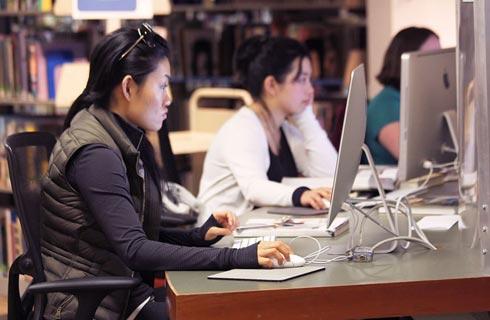- IDP China>
- 课程库>
- 计算机科学>
- 计算机与信息科学>
- 计算机与信息科学概述>
- Doctor of Philosophy in Informatics - Human- Computer Interaction Design
信息学哲学博士-人机交互设计
Doctor of Philosophy in Informatics - Human- Computer Interaction Design

学历文凭
Ph.D.

专业院系
Department of Informatics

开学时间

课程时长

课程学费

国际学生入学条件
IDP—雅思考试联合主办方

雅思考试总分
7.0
- 雅思总分:7
- 托福网考总分:100
- 托福笔试总分:160
- 其他语言考试:120 or above for Duolingo
CRICOS代码:
申请截止日期: 请与IDP联系 以获取详细信息。
课程简介
Human-computer interaction design (HCI/d) creates amazing possibilities, from massive-scale collaboration systems like Wikipedia to everyday innovations such as personal health tracking. But interactive systems also contribute to serious social problems, such as e-waste, privacy concerns, and unequal access. This track is designed to change the way you think. Youll go beyond using technology to solve a problem, to creating a technology experience that will be functional, intuitive, and even delightful for users. With this track, youll learn to think like a designer. Human-computer interaction design research is more geared toward supporting interventionstoward bringing about better possible futuresthan about describing the past or even the present. Human computer interaction design opens up possibilities, such as the following: massive scale collaborative systems like Wikipedia, global hardware/fabrication networks, as seen, for example, in the maker movement, educational applications of augmented and virtual reality, new forms of democratic participation in government, innovations in everyday life, such as personal health tracking, and entertainment computing, such as videogames.
相关申请
 预科
预科 奖学金
奖学金 实习机会
实习机会 在校学习
在校学习 跨境学习
跨境学习 校园授课-线上开始
校园授课-线上开始 在线/远程学习
在线/远程学习
开学时间&学费
学费信息仅供参考,请与IDP联系以获取详细信息
| 开学时间 | 时长 | 学费 | 地点 |
|---|
学校排名

世界排名134
数据源:
泰晤士高等教育世界大学排名
本校相关课程

视觉科学哲学博士
学历文凭
Ph.D.
开学日期
课程费用总额


听力学博士
学历文凭
Ph.D.
开学日期
课程费用总额


语言与听力科学哲学博士
学历文凭
Ph.D.
开学日期
课程费用总额


第二语言研究哲学博士
学历文凭
Ph.D.
开学日期
课程费用总额


宗教学哲学博士
学历文凭
Ph.D.
开学日期
课程费用总额


西班牙语言学哲学博士
学历文凭
Ph.D.
开学日期
课程费用总额

其他相关课程

信息系统工商管理学士
 德克萨斯大学圣安东尼奥分校
德克萨斯大学圣安东尼奥分校学历文凭
Bachelor Degree
开学日期
课程费用总额


项目管理研究生证书
 内布拉斯加大学奥马哈分校
内布拉斯加大学奥马哈分校学历文凭
Graduate Certificate
开学日期
课程费用总额


Bachelor of Science in Informatics - Art
 爱荷华大学
爱荷华大学泰晤士高等教育世界大学排名:342
学历文凭
Bachelor Degree
开学日期
课程费用总额


计算机科学理学学士-生物计算医学预科
 印第安纳大学与普渡大学印第安纳波里斯联合分校
印第安纳大学与普渡大学印第安纳波里斯联合分校学历文凭
Bachelor Degree
开学日期
课程费用总额


Bachelor of Business Administration and Master of Science in Information Systems Technology
 乔治华盛顿大学
乔治华盛顿大学泰晤士高等教育世界大学排名:209
学历文凭
Combined Baccalaureate and Master's Prog
开学日期
课程费用总额


计算机断层扫描高级技术证书
 希尔斯伯勒社区学院
希尔斯伯勒社区学院学历文凭
Advanced Certificate
开学日期
课程费用总额











